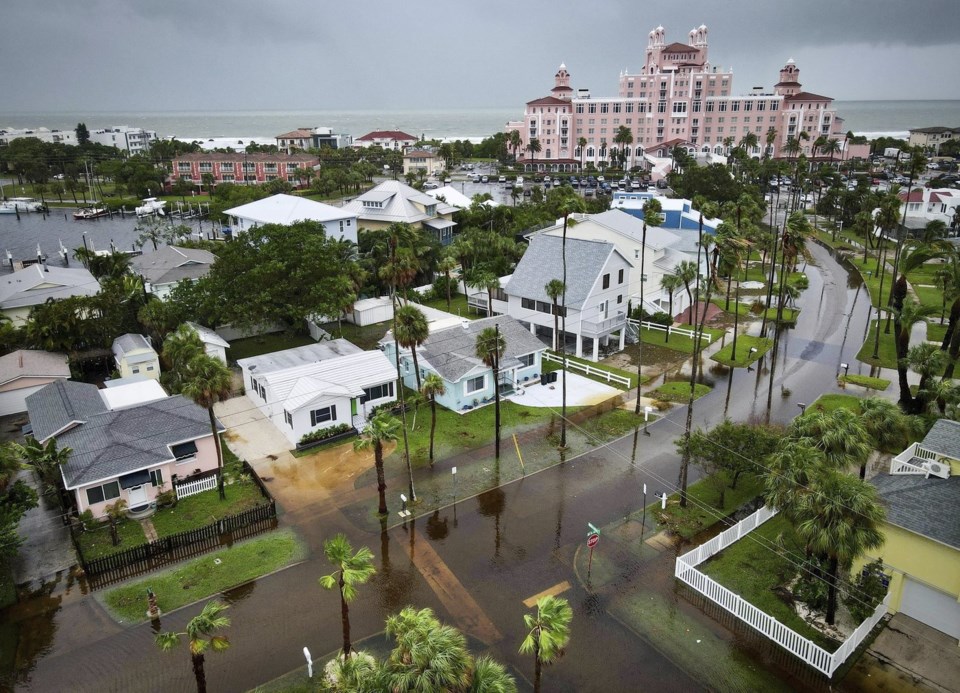TAMPA, Fla. (AP) — Hurricane Debby reached the Big Bend coast of Florida early Monday, bringing with it the potential for catastrophic flooding and life-threatening storm surge as it slowly passes over the northern part of the state. Forecasters warned that, in the coming days, record-setting rain could pummel coastal Georgia and South Carolina as the storm heads east.
The storm made landfall as a Category 1 storm near Steinhatchee, a tiny community in northern Florida of less than 1,000 residents on Florida’s Gulf Coast. It had maximum sustained winds of 75 mph (120 kph) and was moving north-northeast at 10 mph (17 kph), the National Hurricane Center in Miami said. The storm made landfall in one of the least populated areas of Florida, but forecasters warned heavy rain could spawn catastrophic flooding in Florida, South Carolina and Georgia.
Storm surge was expected to be the biggest threat for Florida, with 6 to 10 feet (1.8 to 3 meters) of inundation above ground level predicted in part of the zone near the Big Bend, according to John Cangialosi, a hurricane specialist with the National Hurricane Center.
“That part of the coast is a very vulnerable spot,” he said Monday.
Some areas, including Sarasota and Manatee counties, have already received 10 to 12 inches (25 to 30 centimeters) of rain.
“We expect to have several rivers and streams go into major flood stage," said Kevin Guthrie, the state’s director of emergency management.
Nearly 214,000 customers were without power in Florida on Monday morning, according to PowerOutage.com. In Marion County, which is inland and south of Gainesville, sheriff’s officials noted in a Facebook post Monday that crews were responding to reports of downed power lines and trees that have fallen on roadways and homes.
Gov. Ron DeSantis said some 17,000 linemen are working to restore electricity. He warned residents in affected areas to sit tight until conditions are safe.
“When the water rises, when you have streets that can be flooded, that’s hazardous,” DeSantis said. “Don’t try to drive through this. We don’t want to see traffic fatalities adding up. Don’t tempt fate, don’t try to go through these flooded streets."
Hurricane Debby has followed a track “very similar to Idalia 11 months ago,” DeSantis said. Idalia came ashore near Keaton Beach, Florida on Aug. 30, 2023, with maximum sustained winds of 125 mph. Keaton Beach is about 20 miles north of Steinhatchee. He noted there were fewer power outages with Debby.
Images posted on social media by Cedar Key Fire Rescue early Monday showed floodwaters rising along the streets of the city, located south of where the storm made landfall. Water was "coming in at a pretty heavy pace,” the post said.
Debby was expected to move eastward over northern Florida and then stall over the coastal regions of Georgia and South Carolina, thrashing the region with potential record-setting rains totaling up to 30 inches (76 centimeters) beginning Tuesday through Saturday morning. Flooding is expected to be especially severe in low-lying areas near the coast, including Savannah, Georgia; Hilton Head, South Carolina; and Charleston, South Carolina.
Officials in Savannah said the area could see a month’s worth of rain in four days if the system stalls over the region.
Debby is the fourth named storm of the 2024 Atlantic hurricane season after Tropical Storm Alberto, Hurricane Beryl and Tropical Storm Chris, all of which formed in June. In the Eastern Pacific, tropical storms Carlotta, Daniel and Emilia all churned over the ocean, but they weren’t threatening land.
Residents hunker down as storm passes through
“Right now, we are to trying secure everything from floating away,” said Sheryl Horne, whose family owns the Shell Island Fish Camp along the Wakulla River in St. Marks, Florida, where some customers moved their boats inland.
The sparsely populated Big Bend region in the Florida Panhandle also was hit last year by Hurricane Idalia, which made landfall as a Category 3 hurricane.
“I am used to storms and I’m used to cleaning up after storms,” Horne said.
“We’re all hanging on here - a bunch of us stayed,” Dawn Perez said Monday by phone, as the eyewall of Hurricane Debby bore down on her home in the small town of Perry, Florida. Perez, the director of the town’s tourism department, said she has a new roof after Hurricane Idalia tore it apart in August 2023.
“The winds are intense – I’ve already lost my porch door and a tree, and stuff is blowing all over the place,” Perez said.
Northeast coast also preparing for storm conditions
Emergency managers in New England and New York were monitoring the path of the storm for the possibility of remnants striking their states. Northeast states including New York and Vermont have been hit by heavy rain and thunderstorms in recent weeks and were still coping with flooding and saturated ground.
___
This story has been updated to correct that the Big Bend area is north of Tampa, not south of Tampa.
___
Chandler reported from Montgomery, Alabama. Jake Offenhartz contributed from New York. Jeff Martin reported from Atlanta and Freida Frisaro reported from Fort Lauderdale, Florida.
Kimberly Chandler And Christopher O'meara, The Associated Press



